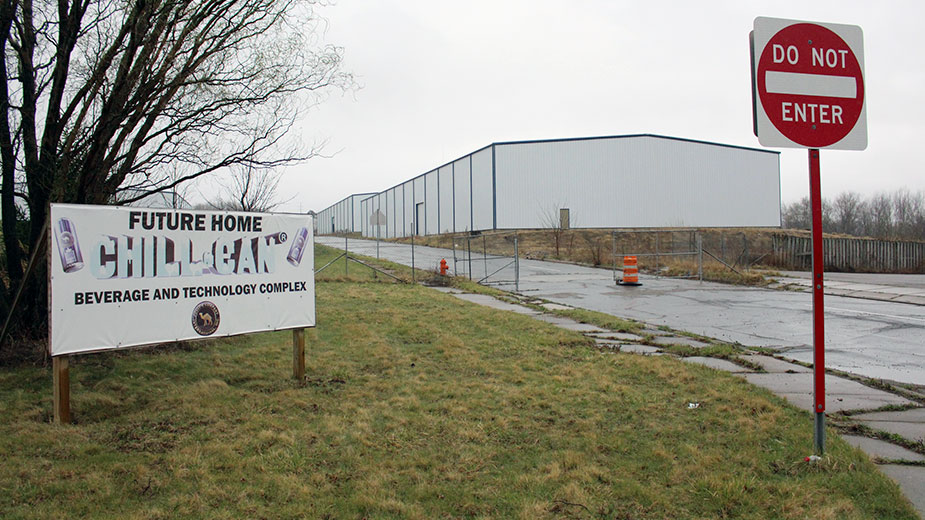Chill-Can Developer Still Owes YSU Nearly $200,000
YOUNGSTOWN, Ohio – The developer behind the beleaguered Chill-Can plant on the city’s East Side is still in arrears to Youngstown State University’s athletics department for nearly $200,000 – months after he promised to remedy the debt.
In August, The Business Journal revealed that West Coast Chill Inc., a brand affiliate of California-based Joseph Co. International and its CEO Mitchell Joseph, owed YSU a balance of $300,000 toward a marketing agreement it signed with the university in 2014.
Two weeks after The Business Journal filed a records request with the university, West Coast Chill made its first installment payment of $100,000, reducing its balance to $200,000. The company then promised to make two additional payments to the university of $100,000 each in October and December of 2020.
However, the company has made a single payment of just $5,000 since last summer, says Ron Strollo, YSU’s director of athletics.
“He had sent us a new payment schedule in late fall or December,” that revised the earlier payment plan, Strollo says. However, that schedule was scrapped because of the effects the COVID-19 pandemic was having on Joseph’s operations in California and the United Kingdom.
“Two weeks later, the governor of California shut his plant down” in response to surging COVID rates in that state, Strollo says. Simultaneously, a second plastics-injection molding operation Joseph owns in England was also shut down because of the pandemic.
With both plants idled, Strollo and the athletics department agreed about two months ago to trim the payment plan to just $5,000 per month until both of his plants were running again at capacity, Strollo says. “I think we’ve received one payment, so a second one should be coming soon.”
Strollo says he’s hopeful Joseph and West Coast Chill will increase its payments by the summer. No firm timetable on the repayment plan has been negotiated, he says.
The debt stems from a marketing agreement that Joseph and West Coast Chill signed with YSU in 2014.
According to the contract, West Coast Chill was to pay YSU $51,250 per year for a sponsorship package to promote the company’s non-caffeinated energy drink. The agreement was signed July 17, 2014, and good for two years with the option to renew each year for the next 10 years. Years three through 10 would include a 5% increase annually, the agreement stipulates.
The agreement included permanent signage at Stambaugh Stadium, signage at YSU’s new softball field, auxiliary scoreboard and media table advertising in Beeghly Center, website advertising, and full-page color ads in YSU’s football and basketball programs. Live promotional spots and 30-second commercials aired during football and basketball radio broadcasts were also included in the deal.
West Coast Chill would also receive membership in the Penguin Club for football and basketball games, as well as hospitality and advertising rights to Penguin Club events such as its scholarship golf outing and silent auction.
The university also agreed to sell West Coast Chill products at all on-campus athletic facilities and select Penguin Club events. And, YSU said it would endow an athletics scholarship in the name of the Joseph family, which would be housed at the YSU Foundation. According to records, the company paid $10,000 toward the scholarship in 2017.
However, West Coast Chill’s energy drink failed to sell in this region. The company discontinued selling the product in Ohio in 2016.
Joseph explained to The Business Journal last year that he believed his contributions to the university outside of the athletics advertising deal would offset costs related to the marketing agreement. According to Joseph, he and his companies have spent at least $112,500 over the years to support YSU though charitable contributions, donations, event sponsorships and in-kind contributions.
At present, neither West Coast Chill nor the Joseph Co. has a marketing relationship with YSU, Strollo says.
Still, Joseph renewed his marketing agreement with YSU in 2016 and each year thereafter until 2020. In some instances, Joseph used advertising space in YSU’s football programs to tout a whole different project the Joseph Co. had undertaken – the Chill-Can campus on the city’s East Side.
The purported $20 million project – facilitated by a $1.5 million grant procured by the city, real estate tax incentives, and more than $360,000 in additional public expenses used to acquire properties and relocate residents on the city’s East Side – has screeched to a halt.
Joseph broke ground in November 2016 on an ambitious project to build a research and production campus dedicated to self-chilling technology and the world’s first self-chilling can. He had promised to hire at least 237 people and meet certain benchmarks in return for the incentives.
More than four years after the groundbreaking, three buildings constructed at the site remain unused, few people have been hired, and not a single Chill-Can has been manufactured there.
Two weeks ago, Mayor Jamael Tito Brown announced that the city had placed Joseph Co. affiliate M.J. Joseph Development Corp. and its CEO on notice that it’s in default of the two development agreements signed with the city in 2017.
Should the company fail to make good on its promises in 60 days, the city could take legal action to reclaim the $1.5 million in grant money it awarded the project, rescind tax breaks given to the company and take back the land used for the development, according to a letter the city sent to the developer March 26.
Nikki Posterli, the city’s director of community planning and economic development, said Joseph had not responded to the letter as of April 9.
As of this posting, Joseph had not returned an email request for comment on the matter.
The mayor acknowledged that putting Joseph on notice was a first step and said he would prefer the project move ahead and bring jobs to the city.
Still, Brown said he had grown tired of hearing the same excuses as to why the project was not moving forward. “I kept hearing the same story over and over,” he said.
Copyright 2024 The Business Journal, Youngstown, Ohio.



